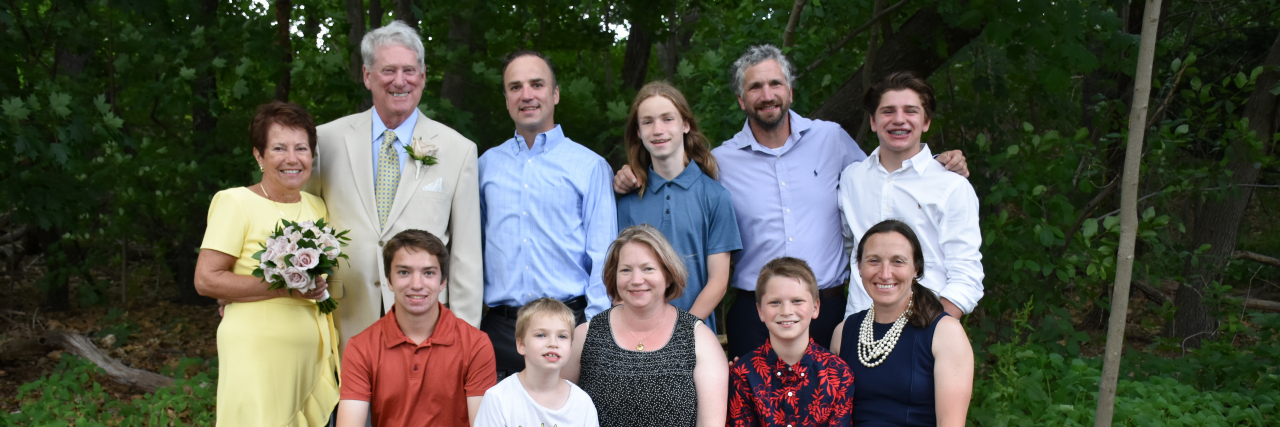My son David’s Grandma McCoy and Grandpa Phil, my mother’s companion of seven years and husband of six weeks, died in September. A brutal car accident. It’s been four months and I am still trying to wrap my head around it. How can they be here and then, suddenly, not? That’s the way it felt, too.
They’d been here in June, our first time together in person in more than 18 months. They traveled with us to a youth soccer tournament; hosted David for an afternoon getaway and swim, just David and Grandma and Grandpa; and spent an afternoon at the zoo, enjoying ice cream while watching the bears. They committed themselves to one another before God and family and celebrated with a fancy dinner at the Capitol Grille and watching the grandkids enjoy the hotel pool the next morning.
The hugs goodbye were long at the end of the visit. We had no idea what was going to happen with the pandemic. We knew cases were rising in my mom and Phil’s home state of Florida. We knew there were breakthrough cases amongst the vaccinated, especially in older adults and those with underlying conditions. We knew nothing is ever guaranteed. We hugged each other tightly. I never imagined that six weeks later the local police would knock on my front door, shattering an idyllic, blue-sky September afternoon with the news that my mother had died, in a car accident 10 minutes from her home. It would be hours more before we learned that Phil had died, too.
How do you explain death to a child? How do you help an autistic child who sees the world in black and white understand that Grandma and Grandpa Phil, who he couldn’t see in person for 18 months and who lived in this mythical place you fly to, really are not there anymore? That they won’t be coming back to visit us? That, though we can look at photos and videos from the past, we can no longer talk to them on the phone, visit with them via Zoom, or swap photos with them by text? How do you explain something when you cannot really comprehend or accept it yourself?
So, we kept it very simple. No mention of souls, Afterlife, Heaven. I want to believe in those things, but they are so abstract and some days I’m not sure. Simplicity was the plan: Grandma and Grandpa Phil got hurt. Their bodies couldn’t work anymore. They died. We still love them and remember them. It’s OK to be sad. It’s OK to miss them. It’s OK to cry. They loved us very much and still do. We keep loving them.
Keeping things simple worked for all of us — adults, children, autistic, neurotypical.
Now, four months later, David and I have a daily, sometimes hourly, routine.
David: “Where’s Grandma?” Me: “Grandma’s body got really hurt and she died.”
David: “Grandma got hurt and died. I can’t see her. Where’s Grandpa Phil?”
Me: “Do you remember?”
David: “He got hurt and died.”
There’s always a quiet pause here, and then: “I love them. I miss them.”
Four months out from that devastating and life-altering day, I realized it wasn’t I that was teaching David something about death and dying, life and love. It was David who was teaching me.
The first time David and I recited this ritual, it shattered my heart in a million pieces. I left the room unable to control the flood of emotion. This cannot be, I thought. There must be some mistake. The next time we recited the ritual, my heart rebroke, but only in a half-million pieces this time. Each subsequent recitation was easier to get through until the stitches in my heart strain, but do not split. My heart, our collective hearts, will never be the same, but they can acknowledge, accept, and withstand the pain.
I’m not saying I’ve fully accepted that my mother and Phil are gone. There are mornings that I still wake up and think it must be a bad dream. At the same time, however, David, our sweet, loving, energetic boy, has helped me process my mother’s death in a new and healthy way. Saying it makes it real. Saying it often slowly removes the emotional and physical shock and pain attached to the words. Saying over and over and over somehow makes the truth of the words OK — not good, not happy, not acceptable, but OK. Saying it leads to surrender to what is. Perhaps most importantly, however, saying it repeatedly has reminded me that although humans are mortal, love is not. I see it in the way David and his siblings look at the photos of their grandmother and Grandpa Phil, take special care around the fragile keepsakes we have to remind us of them, and tell stories about their adventures with them.
Four months out, we’re moving on. I can see the light at the end of the grief tunnel. It’s dim and far off, but I know it’s there. It is beckoning us. We’ll keep saying the words, which have become a liturgy of sorts, as long as David needs to say them to accept what is gone and embrace the love that remains. I might need a little more time to get there. Thanks to David, I have the prayer for this. “We can’t see them, but we love them. We miss them. They love us. Amen.”

